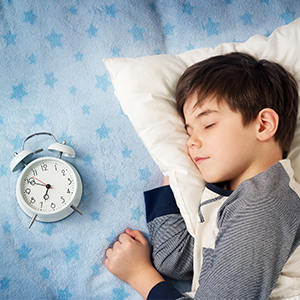Want kids to bring home more A’s? Start with more ZZZ’s. According to sleep
experts and numerous new studies, lost sleep hurts learning and hinders
school-day success. That’s bad news, because today’s kids get about an hour
less sleep each night than they did 30 years ago, says New York Times bestselling author Po Bronson in his book
“NurtureShock: New Thinking About Children.” This lost sleep comes
with a steep price tag – impaired learning and academic success.
How does sleep boost learning? Researchers believe it has to do with the
way the brain processes information during sleep. In fact, Michigan State
University researchers found that children can even learn while they’re
asleep as the brain integrates new information and memories. Researchers
from the University of Florida discovered that newborns learn in their
sleep, and new research from the American Academy of Sleep Medicine shows
that sleep helps students perform better on tests.
Read on for age-specific information on how sleep impacts learning – and
how to help kids get a better night’s rest.
EARLY SCHOOL YEARS 3 – 8
For sleep-deprived kids, school trouble starts early; 10 percent of kids in
early education suffer from sleep disturbances that disrupt learning,
according to a German study. The American Professional Sleep Society
reports that sleep deprivation significantly worsens inattentiveness and
hyperactivity in young children, leading to ADHD-like symptoms (known as
“faux” ADHD).
Even modest sleep deprivation is enough to hinder learning. According to a
study published in the journal SLEEP, a mere hour of lost slumber
is enough to bring on inattentiveness and hyperactivity in young children.
A 2011 study of 6- and 7-year olds shows that language skills, grammar,
spelling and reading comprehension suffer when kids get fewer than nine
hours of sleep per night.
How to help:
Sleep-deprived children may not appear sleepy, says Shelby F. Harris,
Psy.D., Director of the Behavioral Sleep Medicine Program at Montefiore
Medical Center in New York. In fact, they may act hyper and goofy. But
preschoolers and school-age children don’t outgrow the need for a
consistent bedtime and bedtime routine. Establish an age-appropriate
bedtime that allows your child to rest for 10 to 11 hours each night.
TWEEN YEARS 9 – 13
During the late elementary and middle-school years, academics become more
challenging and sports more competitive. But when increasingly busy
schedules start cutting into sleep, kids retain less of what they learn,
says Mark Splaingard, M.D., Director of the Sleep Disorders Center at
Nationwide Children’s Hospital. “Long hours spent on sports practice or
math problems are counterproductive, if these activities keep kids up late
at night,” he notes. Kids will learn more and perform better – whether on
the field or in the classroom – with sufficient shut-eye.
How to help:
Parents need to understand sleep’s importance and guard kids’ sleep hours
zealously, says Splaingard. That means maintaining firm school-year
bedtimes and choosing afterschool and evening activities that end at least
an hour before kids need to wind down for bed.
TEENAGE YEARS 14 – 18
Teenagers are Splaingard’s most sleep-deprived patients, a fact that
doesn’t surprise him. During high school, afterschool jobs, extracurricular
activities, sports, socializing and homework simply don’t leave enough time
for sleep. Most teens need more sleep than parents think – more than nine
hours a night – and chronic sleep deprivation hurts learning at a time when
kids need lots of mental energy for tough subjects from chemistry to
calculus.
But teens’ busy schedules deserve only part of the blame for their sleep
deficits. Cell phones and laptops also keep teens up late, often into the
wee hours. When teens finally power off their computers and go to bed,
round-the-clock access to cell phones disrupts sleep. A new study reports
that sleeping near cell phones puts teens at risk for so-called “sleep
texting:” waking up and firing off text messages during the night without
any recollection of having sent the texts the next morning. All of this
sleep disruption adds up to bleary mornings and bleak report cards.
How to help:
Protect teens’ precious sleep hours with a media curfew – shut down all
electronics an hour before bed and establish a “charging station” outside
the bedroom where teens leave their electronics overnight. This important
step keeps bedrooms free of sleep-disrupting cell phones and computers,
says Harris. “The bedroom should be a place for sleep,” she notes. “It’s
not a spot for homework, watching TV or surfing the Internet.”
When it comes to learning, tutors, cutting-edge gadgets and hours of
homework can’t compensate for hours of lost sleep. When parents prioritize
kids’ sleep needs, learning comes more naturally, says Splaingard. “We
think we’re helping make kids more successful with more activities and more
homework. But what they really need is more sleep.”
How much sleep does your child need? Is your child getting enough rest? Check these guidelines to be sure.
-
3 -6 Years of Age: 10-12 hours per day
-
7-12 Years of Age: 10-11 hours per day
-
13-18 Years of Age: 8-9 hours per day


